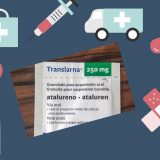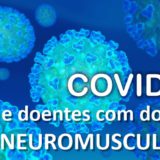Os corticóide orais e o aparecimento de cardiomiopatia na distrofia muscular de Duchenne
USA – Este estudo foi feito com a análise das informações de 5 centros de tratamento americano com 462 meninos com Duchenne acompanhados de 1982 a 2005. O início da cardiomiopatia foi significantemente mais tarde entre os tratados com corticóides. Na idade média de 14,3 anos, 63% dos não tratados com corticóides tinham cardiomiopatia contra 36% dos tratados. A conclusão dos autores é que o uso de corticóides retarda o aparecimento da cardiomiopatia e que o uso de corticóides por 5 anos pode resultar na diminuição de 20% na possibilidade de aparecimento das manifestações cardíacas.
O resumo em inglês pode ser lido abaixo:
(J Pediatr 2013) Oral Corticosteroids and Onset of Cardiomyopathy in Duchenne Muscular Dystrophy
Brent J. Barber, Jennifer G. Andrews, Zhenqiang Lu, Nancy A. West, F. John Meaney, Elinora T. Price, Ashley Gray, Daniel W. Sheehan, Shree Pandya, Michele Yang and Christopher Cunniff
Objective
To estimate the age when cardiomyopathy develops in boys with Duchenne muscular dystrophy (DMD) and to analyze the effect of corticosteroid treatment on the age of cardiomyopathy onset.
Study design
We identified a population-based sample of 462 boys with DMD, born between 1982 and 2005, in 5 surveillance sites in the US. Echocardiographic and corticosteroid treatment data were collected. Cardiomyopathy was defined by a reduced fractional shortening (<28%) or ejection fraction (<55%). The age of cardiomyopathy onset was determined. Survival analysis was performed to determine the effects of corticosteroid treatment on cardiomyopathy onset.
Results
The mean (SD) age of cardiomyopathy onset was 14.3 (4.2) years for the entire population and 15.2 (3.4) years in corticosteroid-treated vs 13.1 (4. in non-treated boys. Survival analysis described a significant delay of cardiomyopathy onset for boys treated with corticosteroids (P< .02). By 14.3 years of age, 63% of non-treated boys had developed cardiomyopathy vs only 36% of those treated. Among boys treated with corticosteroids, there is a significant positive effect of duration of corticosteroid treatment on cardiomyopathy onset (P< .0001). For every year of corticosteroid treatment, the probability of developing cardiomyopathy decreased by 4%.
Conclusions
Oral corticosteroid treatment was associated with delayed cardiomyopathy onset. The duration of corticosteroid treatmentalsocorrelated positively with delayed cardiomyopathy onset.Our analysis suggests that a boy with DMD treated for 5 years with corticosteroids might experience a 20% decrease in the likelihood of developing cardiomyopathy compared with untreated boys.



